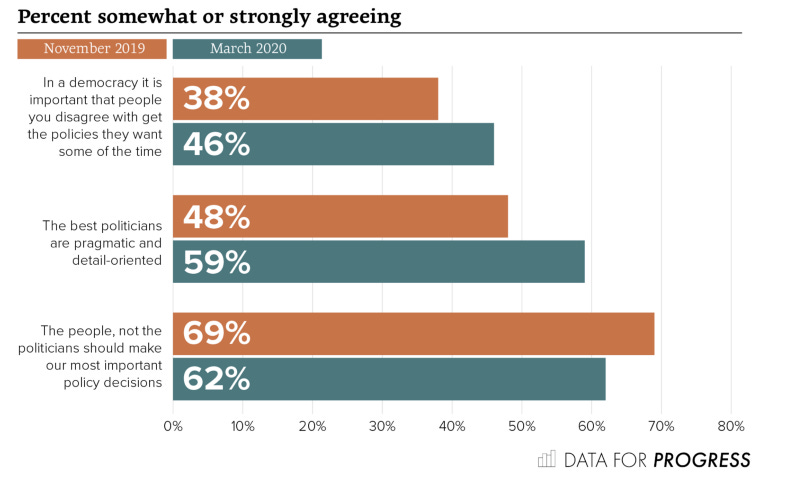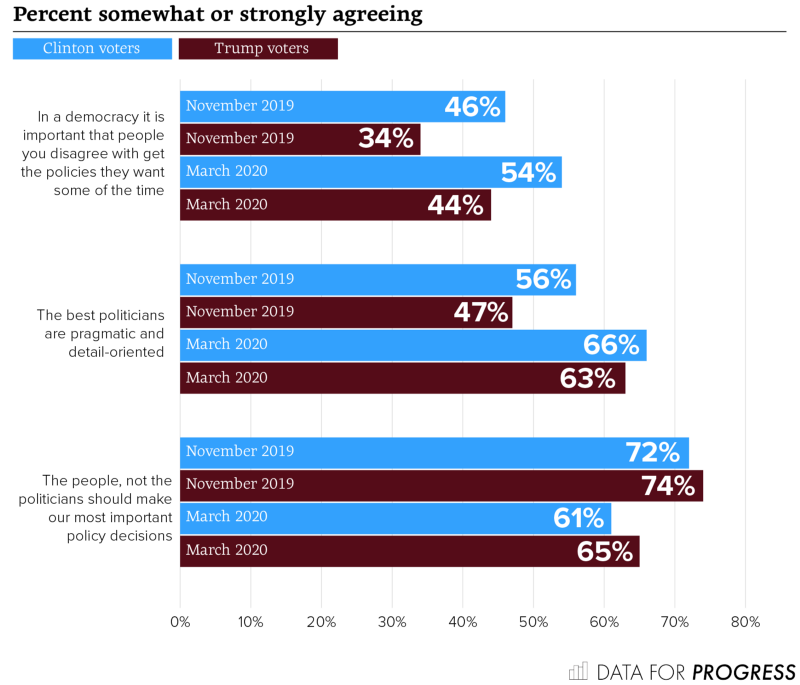The Need to be Pragmatic in a Polarized World
The role of pragmatism as a problem-solving-system.
In today’s world, it seems that everything is becoming increasingly polarized. Whether it’s politics or social issues, people are more divided than ever before. This can make it difficult to have a rational conversation or to find common ground on important issues.
Most of our modern philosophical understanding of the broader issues has been along dichotomies: work vs. play, naturalism vs. humanism, physical studies vs. social studies, labor vs. leisure, intellectual vs. practical, duty vs. interest, and vocational education vs. general education.
What’s not Black, must be White.
The two extremes have always been used as ideological pinpoints to identify one’s stance on a particular issue: are you a Republican or a Democrat? Cristian or Atheist? A white-collar worker, or a blue-collar worker?
Dichotomies are key pieces in identity-building.
Furthermore, it is very much important to mention that historically, dominating powers have defined the key values and pillars of our world.
Most values have been shaped by a juxtaposition of an identity of US vs. THEM, as Edward Said wrote in his famous book: Orientalism.
For instance, through their hegemonic authority, for centuries Western countries have dominated the known world for material gains. The assumptions of Western superiority serve“the ruling world powers” and is “manifested throughout all forms of discourse including literature, research, and conversation both due to and in order to, perpetuate the power of these dominant groups.”
Increasingly, due to globalization and the “ heightened intensity of interaction among cultures around the world,” it’s getting extremely difficult to tell and isolate what belongs to which culture. This “hybridization” of cultures challenges the conventional thinking and “perception of cultures” and “it also provides or the restructuring of other institutions” (Giddens).
As such, a static view of culture has already become inadequate in accurately expressing such cultural and intercultural dynamics.
The interactions between the different dimensions of identity are now much more frequent, leading simultaneously to:
1. Weakening of the nation-state identity;
2. Emergence of local economies and marginalized communities;
3. New cultural, economic, and cultural regions across national boundaries.
The conflict between the local and the global proves current archetypes inadequate and opens new spaces of opportunities in between where pragmatism can emerge.
One of the reasons for the increased polarization in recent times is the way that we consume information. With the rise of social media, we are able to surround ourselves with people who share our views and opinions. This can create a bubble where we are only exposed to information that confirms our existing beliefs, and we become less likely to consider alternative viewpoints — confirmation bias.
2. Another reason for polarization is the way that we communicate with each other. In a world where everyone has a platform to express their opinions, it’s easy to get caught up in the heat of the moment and to make knee-jerk reactions. This can lead to a lack of empathy and understanding, and to a situation where people are more interested in winning an argument than in finding a solution.
A Pragmatic World
“For we live not in a settled and finished world, but [we live] in one which is going on, and where our main task is perspective” (Dewey, 1996, p.151).
Pragmatism is a philosophical movement that emerged in the late 19th century in the United States. Its origins can be traced back to the work of Charles Sanders Peirce and William James, who both sought to develop a new approach to knowledge and truth.
Peirce, a philosopher and logician, first introduced the term “pragmatism” in 1878, in a paper titled “How to Make Our Ideas Clear.” He defined it as “the attitude of looking away from first things, principles, ‘categories,’ supposed necessities; and of looking towards last things, fruits, consequences, facts.”
In other words, Peirce proposed that the meaning of an idea should be determined by its practical consequences rather than by its consistency with abstract principles or categories.
William James, a psychologist, and philosopher, further developed the ideas of pragmatism in his 1907 book, “Pragmatism: A New Name for Some Old Ways of Thinking”. He defined pragmatism as “the attitude of looking away from first things, principles, ‘categories,’ supposed necessities; and of looking towards last things, fruits, consequences, facts.” James argued that truth should be understood as a tool for solving problems, rather than as a fixed and objective reality.
The pragmatism movement gained further popularity in the early 20th century, with the work of John Dewey, who applied the principles of pragmatism to education and democracy, and George Herbert Mead, who used pragmatism to analyze social behavior and communication.
In summary, pragmatism is a philosophical approach that emphasizes the practical use and consequences of ideas, rather than their consistency with abstract principles or categories.
Pragmatism can be defined as a “practical philosophy of intercultural communication”. Historically it has always held a negative connotation, as anti-tradition and utilitarian.
Pragmatism privileges “ongoing dynamic interrelations” over “rigid conceptual dichotomies”. “Thoughtful and creative action and experience stimulated by, with, and in nature and culture over abstract cerebration (nouns) far aloof from the real world”. “Social construction over pre-social structuration”.
“Future and change over past and status quo.
The concept of Pragmatism as expressed by Dewey urges to abandon the “search for causes and forces and turning to the analysis of what is going on and how it goes on” (1954, p.21) because the state is also primarily an unfinished process, “a moving, growing never finished process” (1929, p.295).
It also challenges the role of values, traditionally conceptualized as unchanging and permanent. “Values are as unstable as the forms of clouds” (1929, p.399).
In itself, Pragmatism offers an alternative worldview and problem-solving approach to address conflicts between “modernity and tradition (largely in the Third World) and between modernism and postmodernism”.
It can mediate the divorced relationship between theory and practice and the sharp conflicts between one extreme and the other.
Pragmatism can be conceptualized according to 4 principles:
There are no firm foundations on which knowledge or normative conclusions can be built (Rorty 2009);
There can never be permanent closure in belief, but only provisional closure. According to Charles Sanders Peirce’s distinction between “fallibilism” and “skepticism”, it is not actually possible to doubt all things at once (what he thinks of as “skepticism”), but one can nevertheless accept that any one of one’s beliefs could eventually be shown to be wrong. One has simply to be open to being shown that any particular belief is wrong and thus to revising one’s beliefs — fallibilism (Peirce 2012);
The provisional form of closure is to be found in the decision-making of actually existing human communities. According to Dewey: for political decisions, the relevant community is the entire body of citizens, and for scholarly conclusions, the relevant community is the group of people who have familiarized themselves with the work of that community, as judged by those who are already members of the community.
Knowledge develops through exploratory attempts to change aspects of the world and see what happens. It is in the attempt to solve these problems and in the encounter with the empirical world that we can best determine if our fallible beliefs are in fact mistaken and through which the community of inquiry corrects mistaken beliefs (Peirce 2012). The practical consequences of theories were, the pragmatists thought, the only way to judge between rival theories.
Pragmatism provides a framework for provisional conclusions that can be “revised, through self-correcting communities of inquiry involved in exploratory engagement with the world.” In line with the observations of natural sciences, from pragmatism steam:
1. Importance of the community of inquiry;
2. Importance of correctability and revision;
3. Problem-solving engagement with the world as the criterion of validity.
John Dewey developed a pragmatic theory of inquiry to provide intelligent methods for social progress. He believed that the logic and attitude of successful scientific inquiries, properly conceived, could be fruitfully applied to morals and politics.
The world is changing. The staple archetypes of our society are constantly brought under pressure and shift accordingly. The hard lines previously drawn to establish borders are now blurrier than ever.
The frictions produce two different results:
Those who used to be part of those communities are now confused and having a harder time belonging to them.
Polarization in the political arena leads to extreme stances on both sides.
Practical consequences of such friction include the fact that traditional parties are no longer able to capture electors, leading to the rise of populist parties and to the wave of far-right governments securing majority votes in countries such as Italy.
If we imagine every “value” to represent a collective picture made of a thousand pieces, those pieces are shuffled daily between the different pictures. What used to be part of a puzzle is now part of another, and the picture grows confused.
As such, people are beginning to pick those pieces, regardless of whether they belong to their current puzzle because they fit them. They are becoming increasingly pragmatic and deal with issues singularly, rather than as pieces of their collective identity. They don’t act following the party lines, but identify the issues individually and according to their merits.
According to the latest Georgetown Institute of Politics and Public Service (GU Politics) Battleground Civility Poll, voters are expressing a higher level of concern over the level of polarization in the country.
“While political division across the country remains high, people are offering a clear path forward for political leaders,” said Georgetown Institute of Politics and Public Service Executive Director Mo Elleithee. “With a considerable group of voters preferring compromise-oriented candidates, and a majority who consider themselves centrists, there is hope for those looking for more civility in our politics.”
This becomes evident empirically according to the survey conducted by Data for Progress, from which the public appears to be more open to “bipartisan approaches” to governance.
It appears that the public is more open to bipartisan approaches to governance that rely on good data, attention to detail, and application of expertise.
There are increased expectations among citizens for politicians to look beyond partisanship to protect the public.
The public is right to value pragmatism and defers to expertise during this crisis, but it is also important to be vigilant against attempts to sidestep constitutional principles or attempts to reduce transparency and accountability in the name of protecting the public.
The public also appears to increasingly agree that “the best politicians are pragmatic and detail-oriented” and that “the people and not the politicians should make the most important policy decisions.”
Majorities of Americans describe both parties as ‘too extreme.’ Nearly identical majorities say each party is described at least somewhat well by the phrase “is too extreme in its positions” (63% say this about the Republican Party, 61% about the Democratic Party).
The majority of Democrats want a presidential candidate who seeks ‘common ground’ with GOP. Nearly six-in-ten Democrats (58%) say it is more important for a Democratic presidential candidate, if elected, to find common ground with Republicans on policies even if that means giving up some things Democrats really want. By contrast, about half of Republicans (53%), say Donald Trump should push hard for GOP policies even if that means less gets done; 45% say he should make compromises with Democrats even if that means giving up things Republicans really want.
At the same time, most of the public (78%) agree that divisions between Republicans and Democrats in this country are increasing, while just 6% say they are decreasing and 16% say they are staying the same. About eight-in-ten adults (81%) say they are very or somewhat concerned about divisions between Republicans and Democrats, including nearly half (46%) who say they are very concerned about the growing divide.
This proves the general trend where both sides of the political spectrum are growing more and more polarised. In the immediate aftermath of a crisis, such as the recent coronavirus epidemic, supply-chain, and inflation crisis, the nation typically experiences a “rally around the flag” effect that creates a sense of patriotic solidarity.
Conclusion
The few examples provided are just a practical glimpse of how pragmatism is increasingly highlighted as a possible solution to the classic dichotomies around which our society divides.
Pragmatism as problem-solving highlights the role of the self-correcting community of inquiry in knowledge production and the role of grappling with real-world problems as the source of self-correction.
By forcing a confrontation between alternative theories and between theory and practice, pragmatism promises to deliver a better understanding of society:
1. Focusing more on the causes of problems than their effects;
2. Studying change and causation;
3. Attempting to solve explicitly identified social problems rather than simply producing readings of situations through different theoretical lenses.
Through rigorous scientific observation, pragmatism proposes an ever-changing and improving framework where the democratic society plays a big role in identifying and providing problem-solving frameworks.
As the changing social conditions apply pressure to established identities, pragmatism could emerge as a mediator between theory and practice.
Contrary to heard behavior, pragmatism leads to a world where individuals will deal with issues singularly, rather than being part of pre-defined identities that may appear increasingly inadequate.
Pragmatism could be extremely useful as a problem-solving theory in politics and the way nation-states conduct international relations.
All in all, it could lead to a paradigm shift from a zero-sum model to a win-win model when compromise and practicality are favored over self-interest and imposition.






